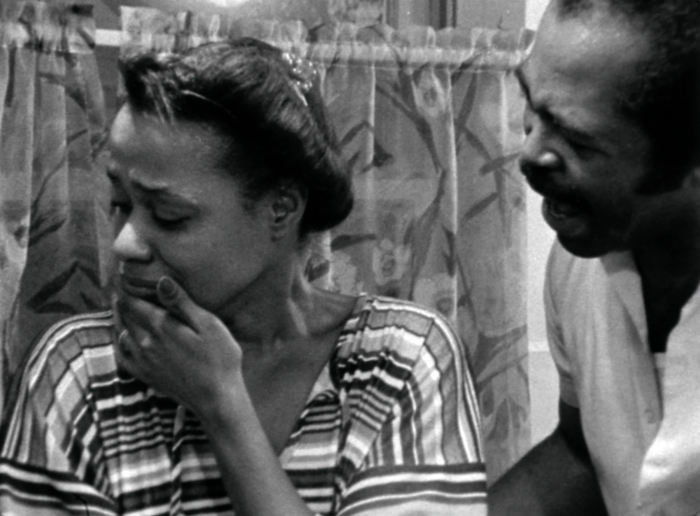
One of my favorite Letterboxd reviews is Filmspotting producer Sam Van Hallgren’s blurb on the 2017 horse drama Lean on Pete. It’s barely more than a sentence: “You’re either the kind of movie person who doesn’t mind waiting around a couple of hours for a kid to burst into tears – or you’re not. Simple as that.” Without providing any details or real spoilers, he told me everything I needed to know about the experience of watching that movie. So I am proud to follow in that tradition with Bless Their Little Hearts: Either you’re the kind of person who can wait an hour for a couple to have an explosive fight – or you’re not.
Nate Hardman plays Charlie Banks, a down-on-his-luck father of three. At first glance, Charlie seems to be trying his best. He’s got a good attitude, viewing being out of work as a spiritual trial that he can overcome. He flat out refuses to turn to more desperate actions to change his situation – when his friends suggest resorting to robbing, he says he won’t risk being separated from his family and then lectures them, “There comes a point in a man’s life where he has to make a decision between the spiritual and the material.” But as we spend more time with Charlie, we see he’s not a particularly great husband or father, and that he spends most of his days in a depressed malaise. And then he has a chance encounter with a woman he knows, a single mother living on welfare…
Kaycee Moore plays Andais Banks, Charlie’s hardworking wife and the one person keeping this family together. From the very beginning, it’s clear that Andais is exhausted, pouring everything into her job and being an attentive mother at home. She doesn’t have enough energy for those two jobs, and thus has almost nothing left to give Charlie as he works through not working. It becomes clear that unemployment is a chronic condition of Charlie’s, and Andais, wary of what’s happened to other families in similar situations, becomes skeptical of Charlie’s intentions. As more evidence piles up, poor Andais’ patience wears thin.
It all builds to a brutal 10-minute one-shot scene where the couple has it out. Charlie is so proud and so depressed he can do nothing but lie to Andais, just as he has gotten so used to lying to himself. But she can’t take it anymore, and calls him out on the underlying denial and selfishness that drive his terrible behavior. It’s so intense because Andais so rightly standing up for herself, but Bless Their Little Hearts had spent most of the time leading up to this moment getting me to empathize with Charlie, and I did. And so it’s not a righteous or liberating scene. It’s just a sad bubbling up of bitter emotions that had been festering for years.
That feeling lingers as the movie goes on. The big scene happens about an hour into Bless Their Little Hearts, meaning there’s about 20 minutes more to see after it. The movie returns to the form it had been in before, somewhat disjointed vignettes of Charlie’s days that leave it to the audience to fill in the blanks between them. I can’t help but wonder if that’s the strongest statement Bless Their Little Hearts makes: that even after something so dramatic like that happens, life goes on. Your situation is not going to change just because you want it to, it takes more than that.
Because of the tragic story, black and white photography, and neo-realistic approach, I couldn’t help but think of Bicycle Thieves as a point of comparison. Which means I should probably mention the Banks children, who are another strong representation of Charlie’s pride and shame. Early on we see Charlie try to teach his son how to be a man, but it comes off as mean and abusive rather than the tough love he probably thinks he’s giving. Later we see that even Andais can only take so much, and that she’s so busy she expects the children to clean and feed themselves. There’s no easy redemption to be found in the next generation either.
Bless Their Little Hearts was written by Charles Burnett, who also served as a cameraman, and set the movie in his own hometown of the Watts, a neighborhood in Southern Los Angeles. It was directed by Billy Woodberry, who was one of the major figures of the LA Rebellion, a movement of African American filmmakers who came out of UCLA and created an alternative to Hollywood. You might remember Woodberry’s name because of his documentary And when I die, I won’t stay dead, which came out a few years ago. What that doesn’t cover is the 30 years between this movie and that one, where instead of getting to make more films he ended up teaching at California Institute of the Arts. Once again I’m left frustrated imagining what could have been… Even though Bless Their Little Hearts is a painful reminder of the damage those kind of thoughts can do.


